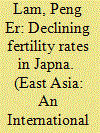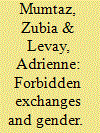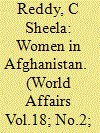| Srl | Item |
| 1 |
ID:
092609


|
|
|
|
|
| Publication |
2009.
|
| Summary/Abstract |
The two key impediments to addressing the ageing crisis of Japan are: electoral politics which avoid making hard decisions painful to voters (especially the hiking of the consumption tax), and even more insidious, the norms of Japanese corporations and patriarchal society which discourage women from marrying and producing babies while holding onto a career and aspirations of their own. If Japan's ageing problem were to persist in the long run, then a concomitant decline in its manufacturing capacity (which underpins its export-dependent economy) and a diminution of its political weight in its international affairs can be anticipated.
|
|
|
|
|
|
|
|
|
|
|
|
|
|
|
|
| 2 |
ID:
124957


|
|
|
|
|
| Publication |
2013.
|
| Summary/Abstract |
A safe, consistent blood supply in Pakistan is critical in combating maternal deaths due to haemorrhage. The dominant form of blood donation in Pakistan is a directed-replacement system. Complex sociocultural values influence from whom a recipient can receive blood. This focused ethnography aimed to investigate if, in this patriarchal society, the gender of the recipient influences who will donate blood. Data were collected from the district of Rawalpindi/Islamabad, Jhelum and Layyah in 2009 and 2012. Findings revealed that gendered notions of blood and blood donation construct reproductive blood loss as less serious than other types of blood loss. Husbands almost universally removed themselves from the process of blood procurement for their wives in the midst of a maternal health emergency. This was due to a combination of gender norms and beliefs about the power of blood, akin to the power of breast milk, to connect husbands and wives in a donor-recipient relationship that would lead to the negation of the marital contract. The inherent gendered devaluation of the lives of women was evident in the manner in which blood was procured for child-birthing women. These complex beliefs indicate that the idealized Euro-American blood system could be ineffective in this context.
|
|
|
|
|
|
|
|
|
|
|
|
|
|
|
|
| 3 |
ID:
133575


|
|
|
|
|
| Publication |
2014.
|
| Summary/Abstract |
According to C Sheela Reddy, women have been the worst sufferers in the post-Taliban period in Afghanistan. Without protecting their position and status from Taliban infl uenced elements and the traditional Islamic patriarchal society, it is naïve to think that the political future of the country will be peaceful and prosperous.
|
|
|
|
|
|
|
|
|
|
|
|
|
|
|
|